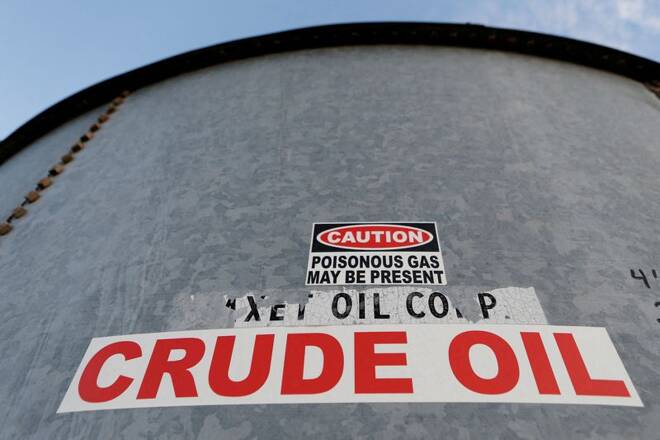Advertisement
Advertisement
Oil gains $5 on weaker dollar, tight supplies
By:
By Sonali Paul MELBOURNE (Reuters) - Oil prices fell $1 in early trading in Asia on Monday, cutting into gains from Friday, as attention turned back to rising COVID-19 cases in China and the prospect of lockdowns again reducing fuel demand in the world's top oil importing nation.
By Laura Sanicola
(Reuters) – Oil prices rose more than $5 on Monday, boosted by dollar weakness and expectations that the U.S. Federal Reserve won’t raise interest rates by a full percentage point at its next meeting to combat inflation.
Brent crude futures for September settlement gained $5.11, or 5.1%, to settle at $106.27 a barrel, after rising 2.1% on Friday.
U.S. West Texas Intermediate (WTI) crude futures for August delivery settled up $5.01, or 5.1%, at $102.60 after rising by 1.9% in the previous session.
On Friday two U.S. Federal Reserve officials indicated the central bank would likely only raise interest rates by 75 basis points at its July 26-27 meeting. Previous reports that the Fed was considering a 100 basis point decision sent markets lower late last week.
The U.S. dollar retreated from multi-year highs on Monday, supporting commodities prices. A weaker dollar makes dollar-denominated commodities more affordable for holders of other currencies.
“Today’s strong advance resulted largely from a sizable and broad-based weakening in the U.S. dollar that has been providing a key driver behind daily oil price swings during the past several weeks,” said Jim Ritterbusch, president of Ritterbusch and Associates LLC in Galena, Illinois.
Both Brent and WTI last week registered their biggest weekly declines in about a month.
Oil supplies remain tight. As expected, U.S. President Joe Biden’s trip to Saudi Arabia did not yield any pledge from the top OPEC producer to boost oil supply.
Biden wants Gulf oil producers to step up output to help to lower oil prices.
Russian gas export monopoly Gazprom declared force majeure on gas supplies to Europe to at least one major customer, according to the letter seen by Reuters, potentially ratcheting up the conflict between Moscow and Europe.
That added support to oil prices, as traders saw it potentially as a precursor to actions by Russia to use energy as a weapon.
“The other clear risk …is that Russia will further slash energy supplies to Europe to try to raise the cost of supporting Ukraine and imposing sanctions,” said Helima Croft, head of global commodity strategy at RBC Capital Markets.
(Additional reporting by Noah Browning in London, Sonali Paul in Melbourne and Florence Tan in Singapore; Editing by David Goodman, Jonathan Oatis, Paul Simao and Cynthia Osterman)
About the Author
Reuterscontributor
Reuters, the news and media division of Thomson Reuters, is the world’s largest international multimedia news provider reaching more than one billion people every day. Reuters provides trusted business, financial, national, and international news to professionals via Thomson Reuters desktops, the world's media organizations, and directly to consumers at Reuters.com and via Reuters TV. Learn more about Thomson Reuters products:
Latest news and analysis
Advertisement
